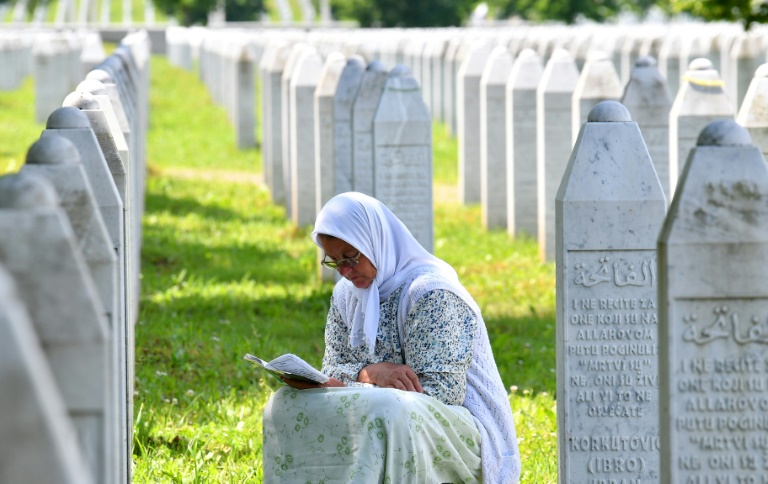A few dozen women sit in a pavilion in front of rows of gravestones listening intently to the judgment: Ratko Mladic will spend the rest of his life in prison.
For some of those gathered at the memorial centre near Srebrenica, the finality of the judge’s ruling on the former Bosnian Serb military chief is enough.
“Thank God,” said Nedziba Salihovic, 67, whose son, husband and brother were killed in the 1995 Srebrenica massacre along with more than 8,000 other Muslim men and boys.
During the reading of the verdict, she held a picture of her son in her hands. At the end, she was the only one who raised her arms and showed emotion.
“I am grateful to the court in The Hague. I trusted the court,” she said.
“He has to be in prison for the rest of his life, just as I have to be alone for the rest of my life, waiting to be reunited with my son, my husband, my brother and many other loved ones in heaven.”
Like the others at the memorial, she had watched in silence, only breaking at the end. There was little outward emotion, but nobody doubted the magnitude of the moment.
“It can’t bring back those who were killed in the family, but it means justice, and that’s important for those I share this space with,” said Almasa Salihovic, whose brother Abdulah was killed in the massacre at the age of 18.
She said she got peace of mind from the judgment, which rejected Mladic’s attempts to overturn his genocide conviction for the massacre.
– ‘No room for denial’ –
Beyond the immediate relief many felt at the verdict, some have a sense that there is still work to do.
“Ratko Mladic did not kill nearly 10,000 people on his own, he did not organise the expulsion of 30,000 people in three days. He did not do anything alone,” said Emir Suljagic, director of the memorial centre.
Suljagic had been a translator in the UN base in Srebrenica in 1995. He was able to get out in the convoy with Dutch soldiers as they left.
“Justice is also to arrest and bring to justice those who worked for Ratko Mladic,” he added.
Another survivor, Nedzad Avdic, also felt the wider significance.
“With this verdict, evil has been called evil, and I hope that Serb politicians will finally accept these facts,” he said.
“I believe that this verdict will no longer leave any room for anyone to deny the genocide in Srebrenica and what was committed here.”
The widows and mothers, united in grief, are also united by hope on this point — that the court’s confirmation of genocide will reduce the denial still rife among Serbs.
“I hope that this verdict will one day influence those who deny the genocide and what was done there,” said Almasa Salihovic.
– Genocide ‘myth’ –
But many Serbs regard Mladic as a hero who fought valiantly to protect his people. They believe he is innocent, and deny any genocide ever took place.
“They are trying to create a myth about the Srebrenica genocide, which never happened,” said Milorad Dodik, leader of the Bosnian Serbs in Republika Srpska — the divided country’s Serbian entity, which today includes Srebrenica.
“I think that this verdict propelled general Mladic straight into a legend because Serbs know that without his command and spirit our people would have suffered much more.”
All around Republika Srpska similar views can be heard, something that relatives of the victims feel is a continuation of the genocide.
But the mothers point out that there is plenty of evidence, if they cared to look.
“They say it didn’t happen. But these gravestones prove it did,” said Munevera Kabeljic, who visited the graves of her husband and her two young sons before listening to the verdict.
“They didn’t come by themselves to lie here. They were killed.”










